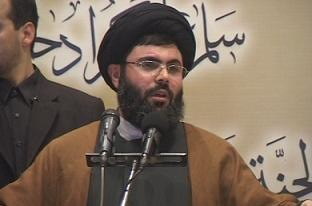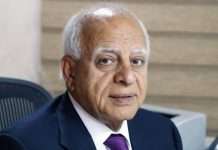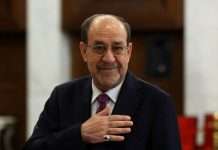
السعودية تضع صفي الدين على لائحة الارهاب
نهارنت/وكالة الصحافة الفرنسية/19 أيار/17
وضعت المملكة العربية السعودية اسم المسؤول التنفيذي في حزب الله هاشم صفي الدين على لائحة الارهاب.
وجاء تصنيفه بحسب وكالة الانباء السعودية، على خلفية “مسؤوليته عن عمليات لصالح ما يسمى حزب الله اللبناني الإرهابي في أنحاء الشرق الأوسط وتقديمه استشارات حول تنفيذ عمليات إرهابية ودعمه لنظام الأسد”.
وسوف تواصل المملكة بحسب بيان أوردته الوكالة “مكافحتها للأنشطة الإرهابية لحزب الله ومن يسهم في تقديم المشورة لتنفيذها بكافة الأدوات القانونية المتاحة، كما ستستمر في العمل مع الشركاء في جميع أنحاء العالم بشكل فعّال للحد من أنشطة حزب الله المتطرفة ينبئ عن أنه لا ينبغي السكوت من أي دولة على مليشيات حزب الله وأنشطته المتطرفة”. وأضاف البيان “لطالما يقوم حزب الله بنشر الفوضى وعدم الاستقرار، وشن هجمات إرهابية وممارسة أنشطة إجرامية وغير مشروعة في أنحاء العالم، فإن المملكة العربية السعودية سوف تواصل تصنيف نشطاء وقيادات وكيانات تابعة لحزب الله وفرض عقوبات عليها نتيجة التصنيف”.
ولفت البيان الى انه “يأتي تصنيف ذلك الإسم هذا اليوم وفرض عقوبات عليه استناداً لنظــام جــرائم الارهـاب وتمويله، والمرسوم الملكي أ/ 44 الذي يستهدف الإرهابيين وداعميهم ومن يعمل معهم أو نيابة عنهما، حيث يتم تجميد أي أصول تابعة لتلك الاسماء المصنفة وفقاً للأنظمة في المملكة ، ويحظر على المواطنين السعوديين والمقيمين في المملكة القيام بأي تعاملات معه”. يشار الى أن هذا التصميف ياتي قبل يوم من انعقاد القمة العربية الاسلامية الاميركية في الرياض بحضور الرئيس الاميركي دونالد ترامب. ومن المفترض ان تركز القمة على العلاقات الاميركية الاسلامية ومحاربة تنظيم داعش وعلى الانشطة الايرانية في الشرق الاوسط.
U.S., Saudi Jointly Blacklist Hizbullah Official on Eve of Trump Visit
Agence France Presse/Naharnet/May 19/17/
As U.S. President Donald Trump prepared to head to Saudi Arabia on Friday, Washington and Riyadh issued their first “joint terrorist designation” — blacklisting a Hizbullah leader. Sayyed Hashem Safieddine is head of the executive council of Hizbullah, an Iranian-backed Lebanese armed movement which Washington has branded a “foreign terrorist organization.” “The Kingdom of Saudi Arabia joined the United States in designating Hashem Safieddine,” the U.S. State Department said in a statement.”As a result, any of his assets held in Saudi Arabia are frozen, and transfers through the Kingdom’s financial sector, are prohibited.”
Separately, the department’s Bureau of Counterterrorism tweeted that this marked the “first-ever” State Department and foreign nation “joint terrorist designation”, underlining the close cooperation between U.S. and Saudi officials. “The action against Safieddine is the latest example of the strong partnership between the United States and Saudi Arabia in combating the financing of terrorism,” the State Department said. The official Saudi news agency SPA confirmed Safieddine’s listing, and alleged he had given his organization advice on carrying out “terrorist acts” and on supplying support to Syrian President Bashar al-Assad’s regime. “The Kingdom of Saudi Arabia will continue to combat the terrorist activities of Hizbullah and those who offer consultation on their implementation through the available legal tools, and it will also maintain its cooperation with its partners across the world to effectively curb Hizbullah’s extremist actions, seeing as no state should stand idly by in the face of Hizbullah’s militias and its extremist activities,” a statement carried by SPA said.
“As long as Hizbullah continues to spread chaos and instability, wage terrorist attacks, and practice criminal and illegal activities across the globe, KSA will continue to designate and impose sanctions on Hizbullah militants, leaders and entities,” the statement warned. Trump has chosen the kingdom as the venue of his first foreign presidential visit, and this weekend he will meet King Salman and address an audience of up to 50 leaders from across the Muslim world on the threat of extremism. Safieddine, who is in his 50s, is the head of Hizbullah’s executive council, which runs the group’s political affairs and social and economic programs in Lebanon’s Shiite community.
He is a cousin of Hizbullah’s overall leader Sayyed Hassan Nasrallah, and is spoken of a potential candidate to succeed him and take charge of perhaps the most powerful non-state movement in an unstable region. The U.S. designation order did not link him to any recent Hizbullah attacks, but noted the group’s historical involvement in the 1983 bombing of a U.S. Marines barracks in Beirut, a U.S. embassy bombing in 1984 and a passenger jet hijacking in 1985.
In the same statement, the State Department also added Muhammad al-Isawi — whom it said had taken over the leadership of the Islamic State group franchise in Egypt’s Sinai peninsula in August 2016 — to the sanctions list. As “specially designated global terrorists,” Safieddine and al-Isawi will see any assets they hold in areas under U.S. jurisdiction frozen, and U.S. citizens will be forbidden from any dealings with them. Separately but simultaneously, the U.S. Treasury added two Yemeni tribal leaders, Hashim Muhsin Aydarus al-Hamid and Khalid Ali Mabkhut al-Aradah, to its own sanctions list, branding them leaders of Al-Qaida in the Arabian Peninsula.






















